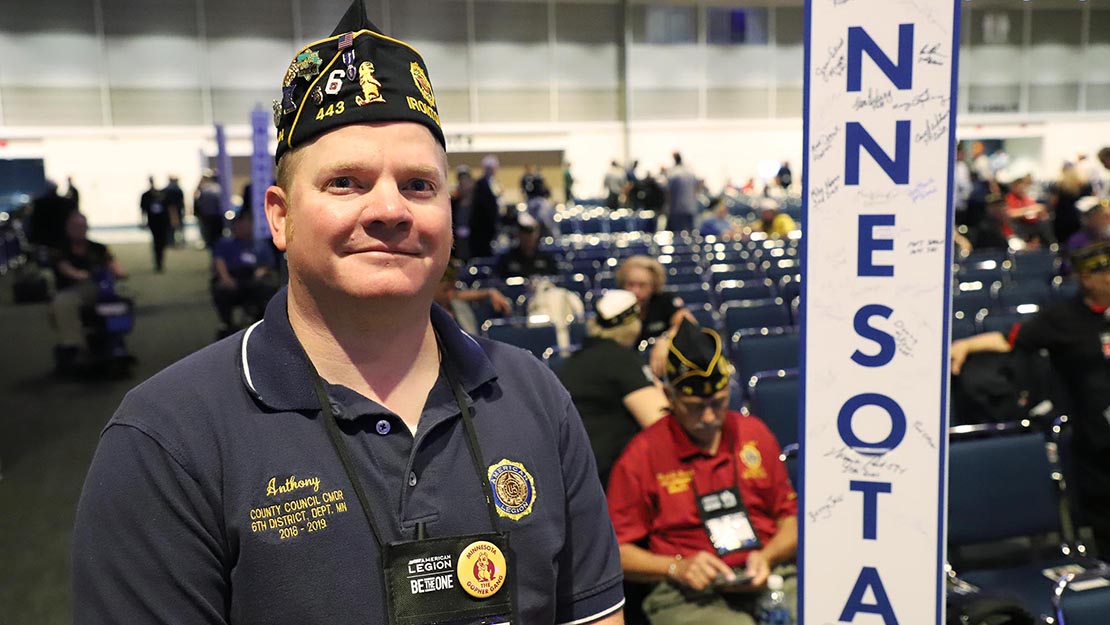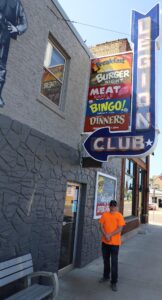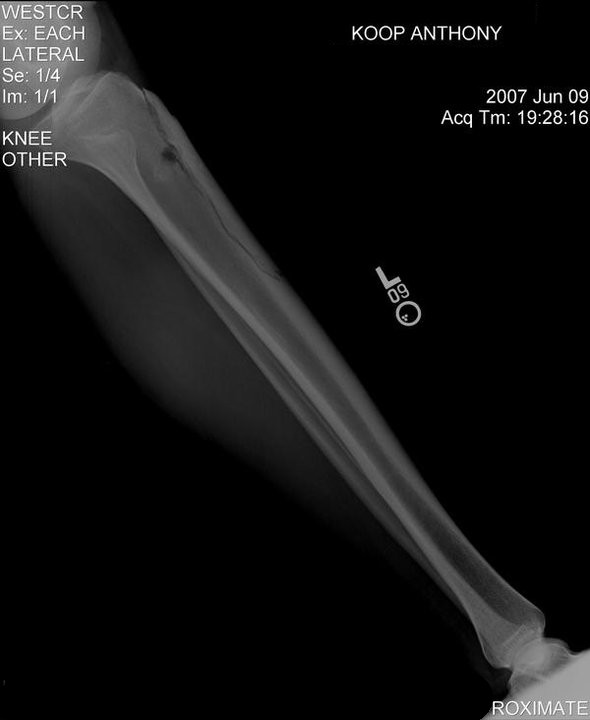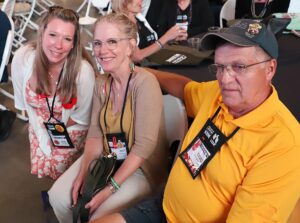Recent 6th District commander served as a medic and was shot in Iraq

Legion-hearted
IRONTON — A lot of folks throughout the Minnesota American Legion Family know Anthony Koop from statewide get-togethers — rallies, conventions and conferences. He’s smiling, making jokes and, when he was 6th District commander this past year, usually winning membership awards.
Few of the Legionnaires at the department level know what the members at Ironton Post 443 knew all along: Koop was shot in Baghdad in 2007 and is a Purple Heart recipient.
If you didn’t glance at his license plate, you probably wouldn’t know. He doesn’t bring it up, but if you bring it up, he is OK with sharing.
“I’ve learned that the best thing to do is to just tell what happened,” he said.
Koop, 42, graduated from Crosby-Ironton High School in 2000. He worked at Rutger’s Bay Lake Resort in the conference center as the conference center supervisor. He enjoyed working with his high school buddies.

Business at the resort was slow in April 2003, and the resort announced it would not be bringing back its full staff. A few months earlier, in February, Koop had been certified as an emergency medical technician.
Meanwhile, the U.S. Army was tracking down Saddam Hussein in Iraq. He joined. Why the Army?
“They had medics. The Air Force recruiter was on vacation. The Marines don’t have medics. The Navy might put me on a ship; I don’t like tight quarters,” Koop said.
That Air Force recruiter missed an opportunity. Koop was in Civil Air Patrol as a kid and wanted to be an airman. He waited and waited for the Air Force but no one called him back. The Army recruiter knew a friend of his father’s, so Koop signed with him in five minutes.
“It was a decision I was making right then and there. If I had waited, I might have changed my mind,” he said.
His MOS was 91W, which is a medic. The Army later converted the number to 63W and titled it “health care specialist.”
Basic was at Fort Jackson, S.C., with AIT at Fort Sam Houston, Texas. His AIT was shortened because he already was an EMT.
The Army sent Koop to Camp Hovey, South Korea, to serve with Headquarters & Headquarters Company, 2nd Battalion, 2nd Brigade, 2nd Infantry Division. Five months later, the 2nd Brigade, 2nd ID was deployed to Iraq, including medical support.
In August 2004, Koop set foot in Ramadi. The Army reclassified his unit as 2nd Brigade Combat Team, which brought in medics, signal, artillery and so forth under one command. He and his medical team provided support for all operations in Ramadi and sent support troops for the Second Battle of Fallujah.
Koop was in Evac Platoon. They would take an M113 APC (armored-personnel carrier) out with the grunts. They hung on the backline and treated the wounded, stabilized them and got them back to the clinic. The clinic prepared them for flight to a CSH (pronounced “cash,” for combat support hospital). They would go to Balad Air Base or Baghdad International for a flight typically to Landstuhl Regional Medical Center in Germany.

The first casualty Koop handled was a soldier shot in the belly. His buddies brought him to the 113, which then took him to the clinic, but he didn’t make the 7- to 9-minute flight to the CSH.
The man appeared ready for transportation, but it turned out the bullet hit all his organs except the left kidney.
“The doctor said if he fell on the operating table after being struck by the bullet, they still would not have been able to save him,” Koop said.
For that, Koop earned his combat medical badge. His 113 did take fire, but it wasn’t hit.
The Evac Platoon would rotate tasks, and when not at the 113 he would spend time at the aid station, putting the wounded on flights or doing triage. There weren’t many mass casualties like on the TV show “M*A*S*H.”
One soldier’s leg was mostly amputated by a rocket-propelled grenade’s fin. Koop helped him get in the clinic, packed him on a chopper to the CSH and eased his worried mind by talking to him. When his unit returned to the United States after one year in Iraq, they went to Fort Carson, Colo., and that man was present to greet them when they exited the airplane in August 2005.
It also meant Koop had circled the earth: Minnesota to South Carolina to Texas to Korea to Iraq to Colorado.
The 2nd ID’s 2nd Brigade new duty station would be Fort Carson, not Korea. He was living on base in that post-combat environment when, in March 2006, he was moved from his support battalion to being a line medic with Baker Company of 2/12, which is 2nd Battalion of the 2nd Infantry Regiment, one of the oldest and most decorated units in the Army.
He still was part of the 2nd BCT, 2nd ID. Same unit shoulder patch as before.
“In my opinion, it is the best job in the military. You get all the fun whether you like it or not,” Koop said.
Line medics, also known as combat medics, go out with the infantry guys and hope to earn the title “doc” from the grunts.
“I wanted to be a combat medic to save lives. It was the whole point of joining, rather than rotating jobs among 30 medics,” he said.
They deployed in June 2006 to a southern Baghdad neighborhood called Al Dora.
“They were crazy. We got nicknamed IED hunters,” he said.
In fact, one guy would borrow Koop’s scissors and use them to cut wires. They would put Koop behind a wall.
“My job was to stand back and be out of the way,” he said.
On June 2, 2007, on routine patrol, they were door-knocking and asking about suspicious activity. He had learned enough Arabic to talk to locals.
On this day, they were parking Humvees on the street in a herringbone formation. He was in an unprotected truck in the back, and he sat in the rear seat on the driver’s side. He was getting in the truck, and he couldn’t find the door handle by memory because of new handle placements.
Koop turned his head to look at the door, then felt something odd.
“I realized I was shot,” he said.
He grabbed the door and felt air woosh across his face at eye level, even though he had safety glasses on. The second shot missed. It was a bullet passing close to his head.
The first shot had struck him right below his left knee. He got in the Humvee and shouted, “I’m shot!”
“What?” was the driver’s reply.

“I’m shot!”
The driver turned down the Army radio.
Koop repeated a third time: “I’m shot!”
He began cutting his pants and treating himself. The truck’s gunner began laying cover fire, and the platoon sergeant came over to his door, dangerously exposing himself to the source of the bullets. Fortunately, no gunfire came his way.
A street vendor pointed to the source — a sniper in a building. Immediately, the sniper shot the vendor in the chest.
It took 10 minutes for the soldiers to bring Koop and the street vendor to Ibn Sina Hospital inside the Green Zone. The vendor didn’t make it.
Koop spent three days there and underwent surgery. The Air Force flew him to Balad Air Base, then flew him to Landstuhl for a second surgery. After a week of recovery, they flew him stateside, where first the Army had him at a clinical recovery place in Maryland before moving him to Fort Carson.
Again, he had circled the planet.
Interestingly, his mother, godmother and grandparents were on vacation in Germany, and his mother and godmother drove four hours to visit him at Landstuhl. Jokes were made about getting shot just to see relatives.
The bullet was a .556 round fired from an M-16A1, probably one America gave Saddam’s military during the eight-year Iran-Iraq War. It broke the plate at the front of the shin. Any pain he experiences today is residual unless it gets hit directly. Koop also has bad knees, he said, so that doesn’t help. You notice it when he hobbles up steps.
Later, he learned that Charlie Company soldiers two days later found the sniper and took him and other insurgents into custody, then transferred them to the Iraqi Army.
Koop wore a full-length leg cast, which he was supposed to wear for eight weeks. After three weeks, the doctor switched him to a brace, which he described as “a godsend.”
In July 2007, he was promoted to sergeant. At Fort Carson, he was assigned to rear defense, making sure other wounded soldiers made it to appointments. His time in service ended April 7, 2008. He began his VA disability claim before finishing his service. He initially was rated 60 percent. Now, it’s 80 percent.
Koop married Erin Johnson-Lindberg on July 30, 2011. They were in the same schools in high school and junior high in the 1990s. She graduated Crosby-Ironton in 2003. She went off to Central Lakes College, then University of Wisconsin-River Falls. At the time Koop got out, she was living in St. Paul and would come up on weekends. They would hang out together.
Soon, she got a job with Northern Pines Mental Health working at Aitkin High School as a mental health counselor. Now, she works at Crosby-Ironton at a grade school. Koop works as a real estate agent for Coldwell Banker’s Crown Realtors Crosby office.
He joined The American Legion in Colorado outside the PX. A guy had a table, and Koop signed on with the at-large Minnesota post. He knew Ironton had a Legion post. He had been there when he was 21, and he had experienced a welcome-home celebration there, too.

When he got back to Minnesota, he transferred his membership to Ironton Post 443. By the fourth meeting, they made him first vice commander. He had ideas, but they didn’t care for his ideas. He stopped going.
Then he realized they really needed help, and he wasn’t going to just give up. Koop returned and explained that meetings are on the same days he has darts league. They changed the date of the monthly meeting. Koop then got a buddy to join so he wouldn’t be the only young buck in his post.
He was good with numbers. He became the finance officer. Then he was the membership director. If there was a need, he chaired it, including baseball.
Koop was the commander for the Aitkin-Crow Wing County Council from 2017 to 2023. He served as 6th District commander 2023-24. Koop is the service officer, judge advocate and gambling manager for Post 443. He’s been gambling manager since 2016, and he set to work to modernize the system, like using CG Made Easy software to produce monthly tax returns.
The post handles gambling for the bar at the post and at the Town Tavern next door.
In the 6th District, Koop is the post development chairman and assists with media and membership. At the Department of Minnesota, he is the liaison to the Legionville Board of Directors.
Anthony and Erin have two children. Marek, 10, is their son, and Maren, 8, is their daughter. They live on a dead-end road in the country, surrounded by a farmer, a retired cop, retired CPA, a doctor, a retired teacher, corn fields, a pole barn and pine trees.


